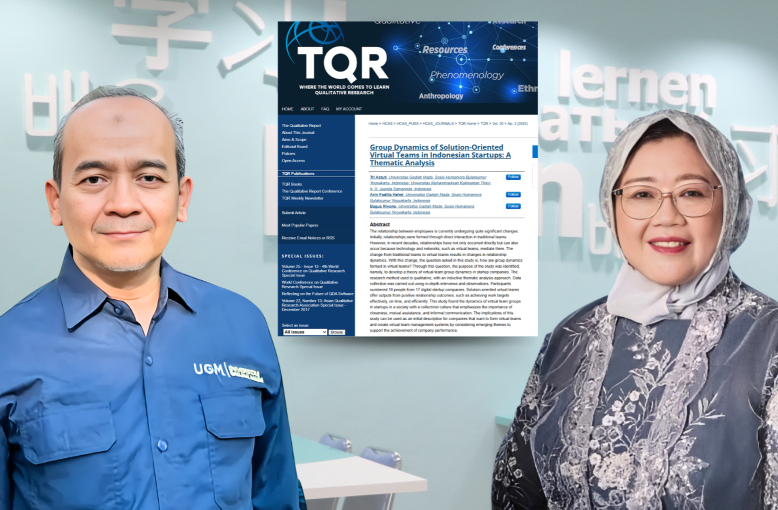
Yogyakarta, 27 Maret 2025 – Tri Astuti, alumni Program Doktor Psikologi, Fakultas Psikologi, Universitas Gadjah Mada, bersama Avin Fadilla Helmi dan Bagus Riyono, telah menerbitkan artikel berjudul “Group Dynamics of Solution-Oriented Virtual Teams in Indonesian Startups: A Thematic Analysis” dalam jurnal The Qualitative Report, Vol. 30, No. 3 (2025). Jurnal ini terindeks Scopus (Q3) dengan SJR 2023 sebesar 0,495 dan Impact Factor (IF) 1,1.
Penelitian ini menganalisis dinamika kelompok dalam tim virtual yang berorientasi pada solusi di startup Indonesia. Menggunakan pendekatan analisis tematik, studi ini mengungkap faktor-faktor utama yang memengaruhi kolaborasi efektif dalam lingkungan kerja jarak jauh. Temuan utama menunjukkan bahwa komunikasi yang adaptif, kepemimpinan partisipatif, dan budaya kerja yang fleksibel memainkan peran krusial dalam meningkatkan sinergi tim dan produktivitas. Hasil penelitian ini memberikan wawasan berharga bagi pemimpin startup dan praktisi manajemen dalam mengoptimalkan kerja tim virtual di era digital.
Berikut ini abstrak, kata kunci, dan link artikel tersebut.
Abstract. The relationship between employees is currently undergoing quite significant changes. Initially, relationships were formed through direct interaction in traditional teams. However, in recent decades, relationships have not only occurred directly but can also occur because technology and networks, such as virtual teams, mediate them. The change from traditional teams to virtual teams results in changes in relationship dynamics. With this change, the question asked in this study is, how are group dynamics formed in virtual teams? Through this question, the purpose of the study was identified, namely, to develop a theory of virtual team group dynamics in startup companies. The research method used is qualitative, with an inductive thematic analysis approach. Data collection was carried out using in-depth interviews and observations. Participants numbered 18 people from 17 digital startup companies. Solution-oriented virtual teams offer outputs from positive relationship outcomes, such as achieving work targets effectively, on time, and efficiently. This study found the dynamics of virtual team groups in startups in a society with a collectivist culture that emphasizes the importance of closeness, mutual assistance, and informal communication. The implications of this study can be used as an initial description for companies that want to form virtual teams and create virtual team management systems by considering emerging themes to support the achievement of company performance.
Keywords: group dynamics, virtual team, startup, teamwork, leader-member relationship, thematic analysis
Publikasi ini dapat diakses di Link: https://nsuworks.nova.edu/tqr/vol30/iss3/6/
Berdasarkan kata kuncinya, artikel ini adalah luaran penelitian yang fokus pada SDG: 4, 8, dan 10.
Selamat kepada bu Avin Fadilla Helmi, dan pak Bagus Riyono.
***
Penulis & Editor: Tim UP & Humas
